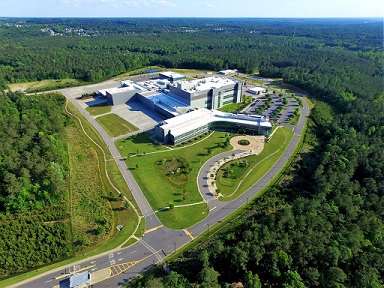
Seqirus Breaks Ground for $9M Expansion of Vaccine Plant

Seqirus, the world’s second largest influenza vaccine company, has broken ground for a $9 million expansion of its massive manufacturing facility in Holly Springs.
Seqirus said the construction of a 15,000-square-foot warehouse would enable the company to grow its seasonal influenza vaccine business and support its biosecurity partnership with the U.S. government in pandemic preparedness.
The company is ramping up its production of flu vaccines. It has made more than 21 million doses this year and aims to double that amount in the next few years.
“The investment will contribute to the capacity and quality of material stockpiles while escalating the state of readiness, reliability of supply and speed of response in the event of a deadly pandemic,” Seqirus said in announcing the expansion.
As production expands, Seqirus said it expected to add to its workforce of 550 full-time employees and 150 contract workers.
The expansion will bring the plant to nearly a half million square feet – about the size of nine football fields – at the 185-acre site.
The $1 billion plant was built by Novartis and began production in 2014. The North Carolina Biotechnology Center and numerous public and private partners collaborated for several years to recruit the facility to North Carolina. Novartis sold the plant and its vaccines business in 2015 to the vaccines division of CSL Ltd., an Australian biopharmaceutical company, for $275 million. CSL renamed the vaccines business Seqirus.
The Holly Springs plant, located 24 miles south of Research Triangle Park, produces vaccines through a novel cell culture process instead of the traditional method of using poultry eggs. The inactivated viruses that protect against flu infection are grown, or cultured, in mammalian cells inside sterile, stainless-steel bioreactors.
The process allows faster scale-up of vaccine production, which could be critically important in the event of an influenza pandemic or a bioterror attack. The process also avoids the risk of vaccine contamination by chickens infected with avian flu.
Seqirus’ Flucelvax Quadrivalent vaccine, approved by the U.S. Food and Drug Administration in 2016, protects against four strains of influenza.
In November Seqirus announced a $52 million expansion of its flu vaccine production plant in Liverpool, England, that will add 100 jobs there. The company also has vaccine-production plants in Australia and Germany.
Seqirus has more than 2,000 employees worldwide and a commercial presence in 20 countries. Its parent company, CSL Ltd., headquartered in Melbourne, Australia, employs about 20,000 people in more than 60 countries.
